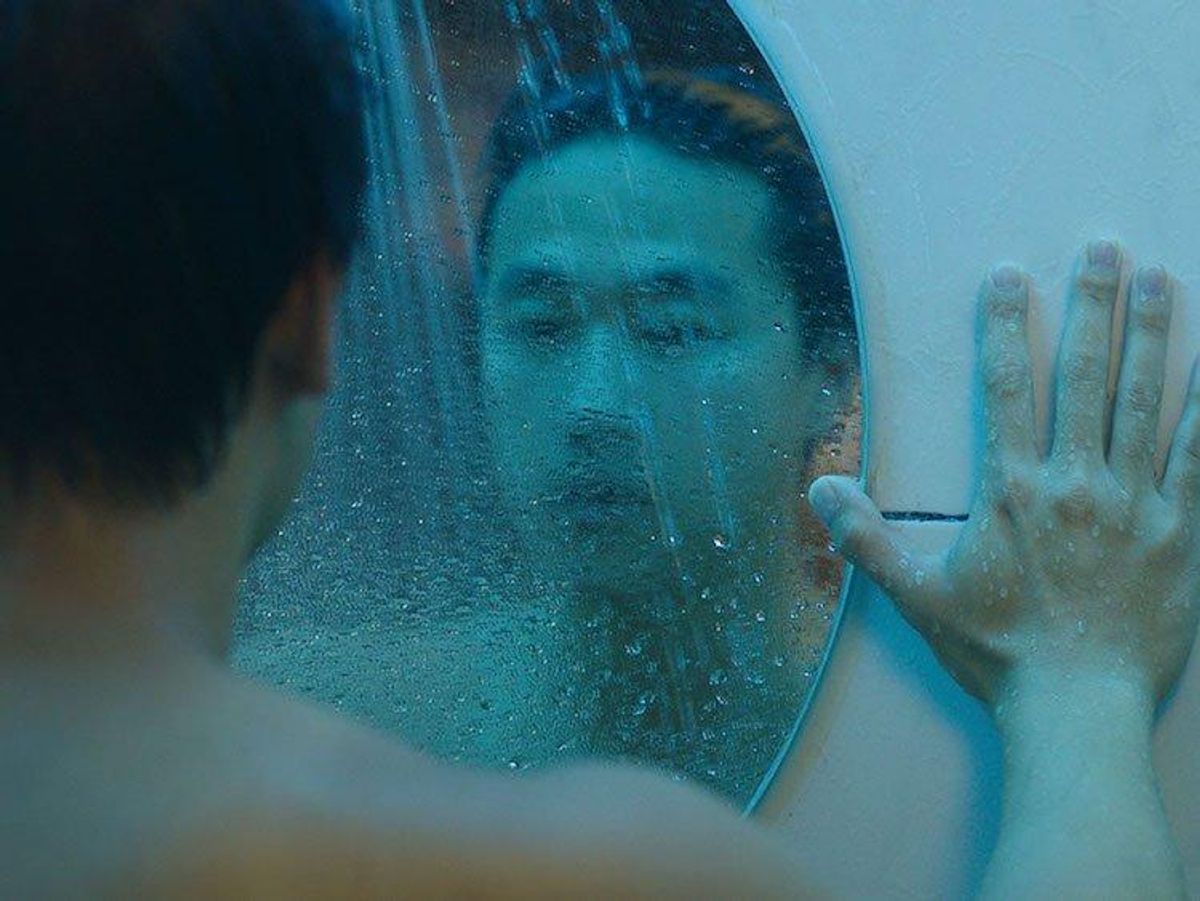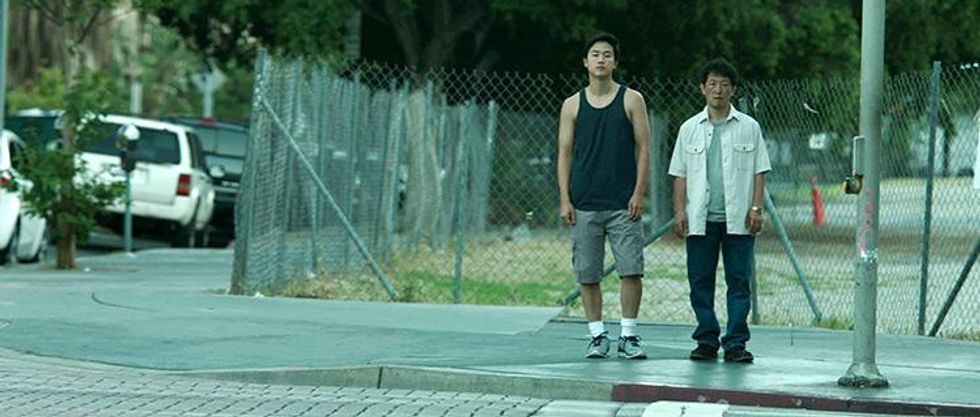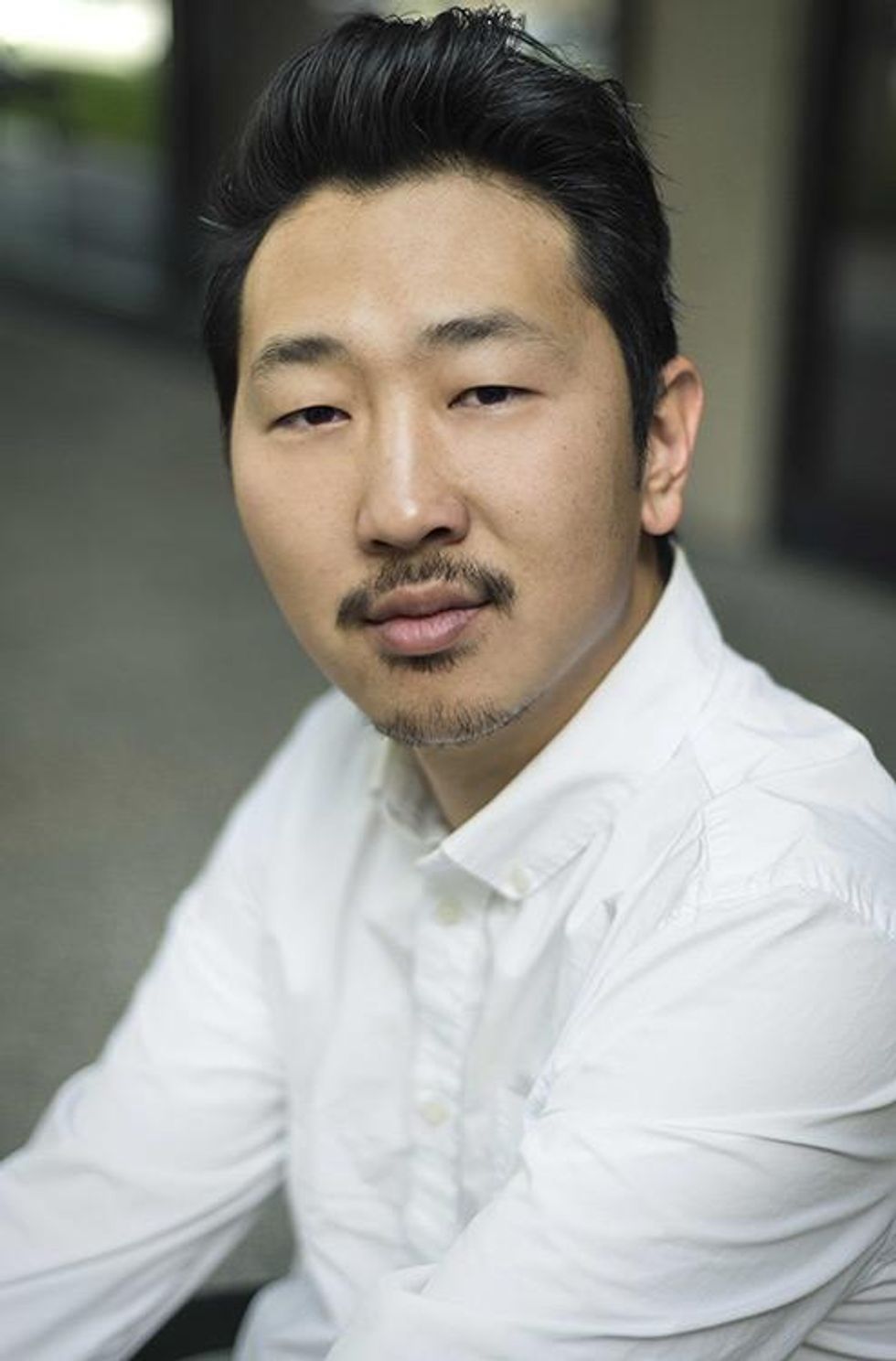When director Andrew Ahn set out to cast Spa Night -- a new film about a Korean-American teen coming to terms with his sexuality in Los Angeles -- he had a very specific set of criteria in mind for the starring role of David. The part required the actor to be Korean-American, near the same age as the character, and fluent in Korean, English, and Spanish. The actor also had to be comfortable with playing a gay role. Needless to say, the search wasn't easy.
"We saw less than 100 actors for the lead role in this film," Ahn told The Advocate. "And I can tell you, if I had put out a casting call for 18-25-year-old white male actors, I probably could have seen 1,000 people."
Fortunately, despite this limited pool, Ahn discovered Joe Seo, a talented actor who not only checked these boxes but brought the part of David to life. The Outfest Los Angeles LGBT Film Festival, which awarded Spa Night its U.S. Grand Jury Prize, even gave Seo a special honor for "his striking ability to convey inner turmoil rising to the surface."
This ability is essential for a character that -- despite being trilingual -- is speaking mostly to internal demons. In the film, the 18-year-old David struggles to please his parents with high SAT scores. But he also secretly works to support them financially after the family business fails, by working in a spa. There, he is tasked with policing the sexual activity of male patrons, which he also longs to join.
Ahn was lucky to find Seo, because without an expert actor in this nuanced central role, the film would have fallen apart. The role's existence is a triumph, because historically there have been so few films that place the lives of gay Asian-Americans front and center. Indeed, casting is but one of several hurdles that keeps more productions like this from being made.
Another? No white movie stars. In fact, Spa Night has no significant white characters, as the story is so focused on David, his parents, and their community in the L.A. neighborhood of Koreatown. For other films, this situation would be a death knell for financing. But when someone expressed interest in becoming an executive producer -- but only if Ahn wrote a part for a "star to attract financiers" -- Ahn refused. Such an act, he reasoned, would betray the intent of the story.
"If it were a different story, I would have," Ahn said. "I consider myself a practical person, and I wouldn't give up an opportunity if it felt right. But it just didn't feel right here."
"I wanted to tell a story about a gay Korean-American identity that was defined within itself," he said. "I didn't want to have to define what it means to be gay and Asian by showing a white character looking at us and saying, 'Oh, this is what you are.' I didn't want the film to be about how other communities perceive this community. It was how do we perceive each other within the community."

Against these odds, Spa Night was made, and it's now playing in theaters in New York in Los Angeles. It's a major coup for Ahn but also for the visibility of a group of people who are either erased or relegated to the sidelines in films. The obstacles to its creation -- in casting, financing, and production -- frustrated Ahn at the time, but he knew his film was important. Spa Night wasn't just a movie. It was part of a movement.
"I have to say, there were many moments in the process where I kind of wanted to give up," he said. "But I knew that if I did, it would stop other films like this to get made. I really wanted Spa Night to be a movie that inspired others down the line and to feel like this is something doable, this is something viable, and these obstacles shouldn't paralyze you but instead motivate you to keep going."
The film also is a deeply personal project for Ahn. Although there are differences between him and his lead character -- David is an only child, while Ahn has a brother; David struggled academically, whereas Ahn excelled -- they have the same core.
"Emotionally, I feel very in line with David -- how he thinks and feels, his relationship to his parents, the kind of weight of expectation," he said. "All of this is very much coming from an autobiographical place."
Ahn also shares a history with Koreatown, where the film is set. Akin to last year's indie darling Tangerine, which depicted the lives of trans women of color in Hollywood, Spa Night spotlights a community in Los Angeles that is rarely portrayed, despite its location in the heart of Tinseltown. Besides its treatment of gay sexuality, the film is also unusual in addressing issues like immigration, class, and how they affect different generations of this community's residents. Like David's parents, who owned a restaurant, Ahn's parents worked in Koreatown for over three decades, and many of the scenes take place in venues he knows intimately.
There's also the spa culture itself, a space that Ahn found ripe for telling a story of intersectional issues like culture and sexuality. Similar to David, Ahn went there as a child with his father as part of a "tradition to get clean for the upcoming year." As an adult, he discovered an "underground world of cruising that I was just so fascinated by and really wanted to make a movie about. I just thought it was insane that those two cultures exist in the same spaces. It was a really strange revelation."
In ways, Ahn, who is gay and Korean-American, has used moviemaking as his own spa -- a space to process his identity. He came out to his parents with the 2012 release of his short film Dol (First Birthday), which screened at Sundance. He made Spa Night not for commercial gains but because it was a personal project that represented the next step in his exploration.
It was the kind of project he knew he wouldn't mind devoting a lot of time to, because it involved "diving into kind of the thing that has been the hardest for me to reconcile: How do I balance my gay identity and my Korean-American identity?"

Balancing identities is a question that all queer people of color must grapple with at some point in their lives. But a career in Hollywood can complicate matters. Due to a perception of bias, there are still many -- actors, especially -- who do not come out for fear of losing work.
Spa Night's star, Seo, does not identify as gay. Ahn did not ask for the identity of those who auditioned -- this is against the law, as the producers of ABC's The Real O'Neals learned in their own casting. He chose Seo because he "really understood the emotional core of the character." But he also sees how the culture's shift toward diversity -- and more Asian-American leading men -- could paradoxically make the glass-closet ordeal worse for gay Asian-American actors.
"I know a few Asian-American actors who are queer, and in some ways, they kind of lucked out in that, because so many of the roles that they're being cast in aren't particular sexual roles or romantic leads. Their sexuality isn't an issue," he said. "But at the same time, that's because the roles are limited. You kind of, with this restriction, have this hiding place for a little while. So I do think as, with more diversity in film, [the glass closet is] going to become more and more present."
Ahn has seen progress -- the revelation that the character of Sulu in Star Trek Beyond is gay was "awesome," he said. "I'm so glad that happened, and I honestly, I watched that movie just for that reason."
However, he hopes more people will discuss whether incidentialiam of gay and Asian-American characters -- meaning having them present in productions but not really discussing the issues surrounding their identity -- is a sign of progress. For example, Star Trek Beyond's inclusion of a gay Asian character may be a win for representation, but its setting in a post-racial, post-gay universe skirts addressing the issues that affect people within these communties today.
"I do understand that sentiment, but I'm also really hungry for content, for films and TV, that do really specifically talk about what are the issues that face this particular community," he said. "What are the issues you face because you're gay? What are the issues you face because you're Asian-American? Because those are the kinds of stories that can push us forward to where the incidentalism feels earned and isn't just a way to meet a quota to have a diverse cast."
Ahn, who grew up watching Jackie Chan movies and the Margaret Cho TV series All-American Girl, would also like the conversation in the media about representation of LGBT people, Asians, and other groups to extend beyond what isn't on-screen. Instead, he encourages members of the press to pay more attention to the projects that do succeed, like Spa Night or Ray Yeung's new film, Front Cover, which is also playing in theaters.
"It's always been there. It's just that it's not always talked about or written about, and that's what I really hope changes," he said.
As for his own film, Ahn is proud that he made a movie that shows sexuality is not the end-all, be-all of gay men; but it is real, and it is part of a far more complex tapestry of identities, including our place in other communities, cultures, and families.
"In one scene David's getting cruised, and in the next he's having dinner with his parents," Ahn said. "Sexuality is part of who we are. And we are sexual beings. But then we're also children who have parents who want to baby us. There's something about that complexity that I think is really true and human."
See Spa Night in select theaters this weekend in New York and Los Angeles. Watch the trailer below.




















































































Viral post saying Republicans 'have two daddies now' has MAGA hot and bothered